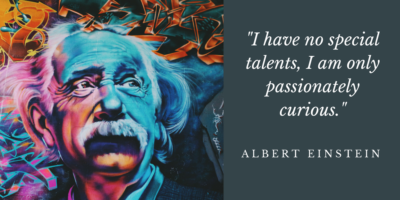Unconscious habits stop us from being more productive. What concerns me most about this behaviour is it’s turning us all into sheep. Where I live I’m surrounded by hills, filled by sheep. Sometimes I admire the simple life they lead, other times I shout at them – they just stand there, looking like they’ve never questioned anything, never disagreed. Sometimes I think they must have wool in their ears.
Sheep are not curious, but contrary to what you may think, sheep are not stupid. They rank just below the pig in intelligence among farm animals. Sheep react to the domestication that has decreased their instinctive behaviour and increased their docile nature, and being ‘one of the herd’ is what they’re all about.
But we need to be heard rather than be one of the herd, to build the habit to do our own thinking. One of the challenges I see in working with entrepreneurs is that they get fixated early on with an idea, and then don’t ask enough questions of what they don’t know. We need to be more inquisitive, to organise our thinking around what we don’t know. It’s becoming a bad habit to simply spend time browsing without purpose.
We need to be less curious about people’s social habits and their selfie photos and more curious about new ideas and learning. Asking questions helps spark the innovative ideas that create startups. You find some curious soul looked at an existing problem, asked insightful questions about why that problem existed, how it might be tackled, and came up with a solution.
The Polaroid story is a good one. The inspiration for the instant camera sprang from a question asked in the mid-1940s by the three-year-old daughter of its inventor, Edwin Land. She was impatient to see a photo her father had just taken, and when he tried to explain that the film had to be processed first, she asked: Why do we have to wait for the picture?
When embrace our curiosity, we think without limits. Curiosity isn’t about solving problems, it’s about learning and experimenting, and that’s precisely the sort of broad, open mindset startups need. It’s fundamental to your success, it shapes your instinct to explore which should grow into an instinct for inquiry, and it ultimately helps you discover new things about what you can do now and in the future.
To be of value in startup life, curiosity needs to be paired with your learning capabilities, from unstructured data, from random facts and from non-linear processes. We’re biased to see learning as something attached to teaching, and that’s definitely not the case when you’re in your entrepreneurial journey.
Curiosity pushes you towards the facts, the data. Your learning skills digest what your curiosity drove you to. Your curiosity will help you build hypothesis and explore; your learning skills will help you organise, understand, and make sense of the data curiosity helped you find. In practice, see them as a combo to be developed and reshaped.
Everyone knows the line curiosity killed the cat. No entrepreneur wants to be that cat, after all, better safe than sorry, right? But here’s the twist; while everyone knows that curiosity killed the cat, the second half of the saying is less well known: satisfaction brought it back. That’s much more encouraging!
So, for an entrepreneur, how does curiosity deliver satisfaction?
1. Curiosity fuels imaginative thinking Entrepreneurs need to be curious to be fully engaged with their world. When things aren’t working as well as they could be, entrepreneurs must gain an understanding of how things work and come up with solutions. Finding these solutions requires curiosity to examine problems from multiple angles and think about how to get better results.
Curiosity also inspires you to be brave and courageous, challenging all those assumptions and hesitations that have held you back, and those unknowns. It was this belief that shaped the philosophy of Andy Warhol. Warhol would walk around New York City on rainy Sundays. That was one of his favourite things to do, and that gave him ideas and inspiration. He called it From A to B and Back Again.
Thinking out of the box is an overhyped phrase, but when you’re curious, you’re present observing the world around you and the active mind leads to the discovery of new ideas, and new possibilities to fuel your imagination.
2. Curious minds connect information better How do you learn about concepts that you didn’t even know existed? It all starts with curiosity. Curiosity leads to questions, and questions lead to answers. Those answers lead to a deeper understanding of the startup world around you and the opportunity to solve problems you wouldn’t even have known existed otherwise.=
Leonardo da Vinci was insanely curious. His observation and belief that everything connects informed most of his work. Making connections between seemingly unimportant things is perhaps one of the most crucial creative thinking skills you can ever master.
Being humble and being curious gives you an open mind, leading to greater knowledge and subsequently connections, which will realise more breakthroughs in your startup.
3. Curiosity reduces uncertainty Assume nothing, question everything Judge a man by his questions rather than by his answers – Voltaire. Curiosity derives its energy through questioning. Brilliant ideas can come out of a better question. Einstein reckoned that if I had an hour to solve a problem, I would spend the first fifty-five minutes making sure I was answering the right question. Start asking better questions to find the right answers.
Ask curious questions. Make a practice of asking questions and listening from a place of curiosity and openness. Stay away from yes/no closed questions, and ask How might we? What if? Go deep. Follow the trail of information like Alice followed the rabbit down the rabbit hole. Don’t be satisfied with surface answers. Ask questions that uncover motivations, illuminate patterns – and ask the questions to the high hanging fruit, not the low hanging fruit.
Fostering curiosity is an entrepreneur’s greatest weapon against the fear of failure. Being curious allows you to welcome surprises – even negative ones – as you seek to discover what works and what doesn’t. The curious are willing to acknowledge failure and, instead of seeing it as disheartening, see it as a basis for learning.
4. Be curious about customers Don’t see customers simply as a transaction or an opportunity for revenue, understand why they buy from you and how your offering helps your customers’ customers. You need an external focus beyond winning the next customer, and see them as a source of innovation: What would an existing or new customer say to this? An enquiring mentality, asking is this the best we can do? How do our customers feel about their interactions with us? What other products or services would our existing customers buy from us if available? will bring success
When you are curious about what your customer is experiencing, you learn how to make your product or service better, and new ways to reach new customers. Curiosity makes you a better listener, better listeners keep customers happy and thus helps to build lasting relationships.
5. Curiosity feeds your decision-making Curiosity is the key trait for finding out what we don’t know. I’m always minded of former US Defence Secretary Donald Rumsfeld who made semantic history back in 2002 when he gave the profoundly perplexing explanation about known knowns, known unknowns and unknown unknowns in relation to the military conflict in Iraq:
As we know, there are known knowns; there are things we know we know. We also know there are known unknowns; that is to say we know there are some things we do not know. But there are also unknown unknowns – the ones we don’t know we don’t know.
Those three sets of simple word pairs, used by Rumsfeld to describe military strategy, also convey powerful ideas with relevance to developing your startup thinking. Satisfying your curiosity and making entrepreneurial decisions based on knowns – truth, facts, and evidence – are far more likely to succeed than those based on hopes, wishes, and mythology.
Curiosity is also linked to greater analytic ability and problem-solving skills. A curious person is more likely to learn from mistakes, try new things, explore new ideas, engage more deeply, be more adaptable, take risks, are more comfortable with uncertainty and more resilient in the face of challenges.
6. Be curious about your competition Curious people’s minds are always active instead of passive. The mental exercise caused by curiosity makes your mind stronger and makes you observant of new ideas. Without curiosity, new ideas may pass right in front of you: How is your competition solving the problems in your industry? What are they doing better than you? How could they improve? What can you learn from them
Curious founders connect with their customers more as highlighted above, and use curiosity to stay ahead of their competition. It’s all too easy to fall into the trap of either feeling superior or like you are trailing behind your competition. Instead, use your curiosity to learn from both the successes and mistakes of your competition to improve. Staying curious about your competition, and where your industry is headed, will help you see around corners and avoid pitfalls, driving you to innovate and create new offerings that outpace the competition.
Entrepreneurs, by their very nature, are always looking for new ways to do things, pushing boundaries, seeking creative ways to solve problems and better ways to reach their audience. As Walt Disney said, We keep moving forward, opening new doors, and doing new things, because we’re curious and curiosity keeps leading us down new paths. So ask yourself, What am I most curious about in my startup?
Back to the opening paragraph of this blog. Don’t be a startup sheep. I’m curious that sheep only sleep 3.8 hours in a day, meaning they are active 20.2 hours a day. What do they think about for all that time? We laugh at sheep because sheep just follow the one in front. But humans can out-sheep the sheep, because at least the sheep need a sheep dog to keep them in line. Stay curious. Ensure you’re not in danger of following the herd yourself.


